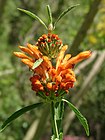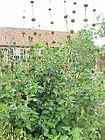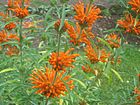Note: This is a project under development. The articles on this wiki are just being initiated and broadly incomplete. You can Help creating new pages.
Difference between revisions of "Leonotis leonurus - Lion's tail"
(→How to plant/cultivate) |
(→References) |
||
| Line 73: | Line 73: | ||
<references> | <references> | ||
| − | <ref name="chemical composition">[https://www.tandfonline.com/doi/full/10.1080/13880200902942428 " | + | <ref name="chemical composition">[https://www.tandfonline.com/doi/full/10.1080/13880200902942428 "Chemical constituents"]</ref> |
| − | <ref name="Leaf">[http://pza.sanbi.org/leonotis-leonurus " | + | <ref name="Leaf">[http://pza.sanbi.org/leonotis-leonurus "Plant descripton"]</ref> |
| − | <ref name="How to plant/cultivate">[http://tropical.theferns.info/viewtropical.php?id=Leonotis+leonurus " | + | <ref name="How to plant/cultivate">[http://tropical.theferns.info/viewtropical.php?id=Leonotis+leonurus "Cultivation details"]</ref> |
</references> | </references> | ||
Revision as of 18:08, 7 June 2019
Leonotis leonurus is a plant species in the Lamiaceae (mint) family. The plant is a broad leaf evergreen large shrub. and it is native to South Africa and southern Africa.
Contents
- 1 Uses
- 2 Parts Used
- 3 Chemical Composition
- 4 Common names
- 5 Properties
- 6 Habit
- 7 Identification
- 8 List of Ayurvedic medicine in which the herb is used
- 9 Where to get the saplings
- 10 Mode of Propagation
- 11 How to plant/cultivate
- 12 Commonly seen growing in areas
- 13 Photo Gallery
- 14 References
- 15 External Links
Uses
Eczema, Cuts, Skin rashes, Boils, Haemorrhoids, Cough, Cold, Influenza, Chest infections, Diabetes, Hypertension.
Parts Used
Chemical Composition
Lamiaceae is rich in flavonoids and have been reported to contain flavanones (Ulubelen & Brieskorn, 1977 Ulubelen A, Brieskorn CH (1977)[1]
Common names
| Language | Common name |
|---|---|
| Kannada | |
| Hindi | |
| Malayalam | |
| Tamil | |
| Telugu | |
| Marathi | NA |
| Gujarathi | NA |
| Punjabi | NA |
| Kashmiri | NA |
| Sanskrit | |
| English | lion's tail |
Properties
Reference: Dravya - Substance, Rasa - Taste, Guna - Qualities, Veerya - Potency, Vipaka - Post-digesion effect, Karma - Pharmacological activity, Prabhava - Therepeutics.
Dravya
Rasa
Guna
Veerya
Vipaka
Karma
Prabhava
Habit
Identification
Leaf
| Kind | Shape | Feature |
|---|---|---|
| Simple | lanceolate | The narrowly lanceolate 50-100 mm green leaves are rough on the upper leaf surface and velvety on the lower leaf surface and have toothed margins |
Flower
| Type | Size | Color and composition | Stamen | More information |
|---|---|---|---|---|
| Unisexual | 2-4cm long | bright orange | 5-20 | Flowers Season is June - August |
Fruit
| Type | Size | Mass | Appearance | Seeds | More information |
|---|---|---|---|---|---|
| simple | 7–10 mm | clearly grooved lengthwise, Lowest hooked hairs aligned towards crown | many | {{{6}}} |
Other features
List of Ayurvedic medicine in which the herb is used
- Vishatinduka Taila as root juice extract
Where to get the saplings
Mode of Propagation
How to plant/cultivate
A plant of subtropical to tropical climates. Plants can tolerate some frost. Seed - no pre-treatment is necessary. Seed can be sown in situ, but is best in containers. Germination is usually fast and good. Seedlings grow away quickly and should be potted up as soon as they are large enough to handle.[3]
Commonly seen growing in areas
Amongst rocks in grassland, Forest margins, Tall grassland, Rocky hillsides and river banks.
Photo Gallery
References
External Links
- Ayurvedic Herbs known to be helpful to treat Eczema
- Ayurvedic Herbs known to be helpful to treat Cuts
- Ayurvedic Herbs known to be helpful to treat Skin rashes
- Ayurvedic Herbs known to be helpful to treat Boils
- Ayurvedic Herbs known to be helpful to treat Haemorrhoids
- Ayurvedic Herbs known to be helpful to treat Cough
- Ayurvedic Herbs known to be helpful to treat Cold
- Ayurvedic Herbs known to be helpful to treat Influenza
- Ayurvedic Herbs known to be helpful to treat Chest infections
- Ayurvedic Herbs known to be helpful to treat Diabetes
- Ayurvedic Herbs known to be helpful to treat Hypertension
- Herbs with Leaves used in medicine
- Herbs with common name in English
- Habit - Semi-deciduous Shrub
- Index of Plants which can be propagated by Seeds
- Herbs that are commonly seen in the region of Amongst rocks in grassland
- Herbs that are commonly seen in the region of Forest margins
- Herbs that are commonly seen in the region of Tall grassland
- Herbs that are commonly seen in the region of Rocky hillsides and river banks
- Herbs
- Ayurvedic herbs that don't have seed photos
- Lamiaceae







